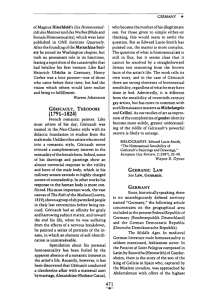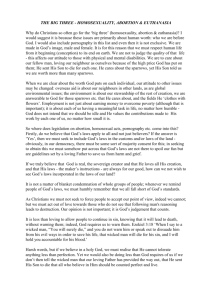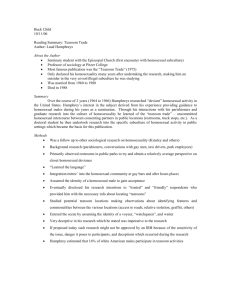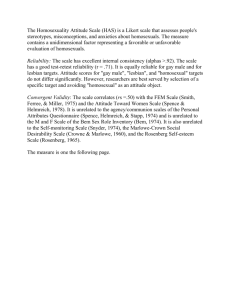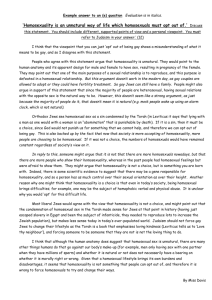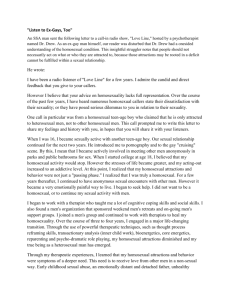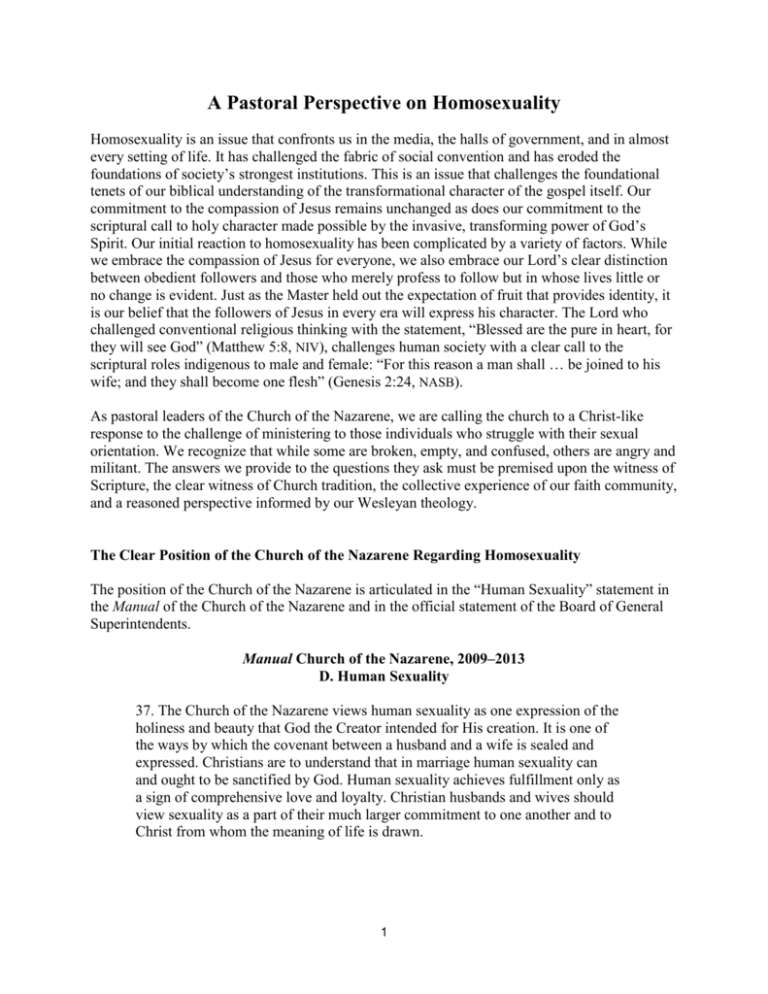
A Pastoral Perspective on Homosexuality
Homosexuality is an issue that confronts us in the media, the halls of government, and in almost
every setting of life. It has challenged the fabric of social convention and has eroded the
foundations of society’s strongest institutions. This is an issue that challenges the foundational
tenets of our biblical understanding of the transformational character of the gospel itself. Our
commitment to the compassion of Jesus remains unchanged as does our commitment to the
scriptural call to holy character made possible by the invasive, transforming power of God’s
Spirit. Our initial reaction to homosexuality has been complicated by a variety of factors. While
we embrace the compassion of Jesus for everyone, we also embrace our Lord’s clear distinction
between obedient followers and those who merely profess to follow but in whose lives little or
no change is evident. Just as the Master held out the expectation of fruit that provides identity, it
is our belief that the followers of Jesus in every era will express his character. The Lord who
challenged conventional religious thinking with the statement, “Blessed are the pure in heart, for
they will see God” (Matthew 5:8, NIV), challenges human society with a clear call to the
scriptural roles indigenous to male and female: “For this reason a man shall … be joined to his
wife; and they shall become one flesh” (Genesis 2:24, NASB).
As pastoral leaders of the Church of the Nazarene, we are calling the church to a Christ-like
response to the challenge of ministering to those individuals who struggle with their sexual
orientation. We recognize that while some are broken, empty, and confused, others are angry and
militant. The answers we provide to the questions they ask must be premised upon the witness of
Scripture, the clear witness of Church tradition, the collective experience of our faith community,
and a reasoned perspective informed by our Wesleyan theology.
The Clear Position of the Church of the Nazarene Regarding Homosexuality
The position of the Church of the Nazarene is articulated in the “Human Sexuality” statement in
the Manual of the Church of the Nazarene and in the official statement of the Board of General
Superintendents.
Manual Church of the Nazarene, 2009–2013
D. Human Sexuality
37. The Church of the Nazarene views human sexuality as one expression of the
holiness and beauty that God the Creator intended for His creation. It is one of
the ways by which the covenant between a husband and a wife is sealed and
expressed. Christians are to understand that in marriage human sexuality can
and ought to be sanctified by God. Human sexuality achieves fulfillment only as
a sign of comprehensive love and loyalty. Christian husbands and wives should
view sexuality as a part of their much larger commitment to one another and to
Christ from whom the meaning of life is drawn.
1
The Christian home should serve as a setting for teaching children the sacred
character of human sexuality and for showing them how its meaning is fulfilled
in the context of love, fidelity, and patience.
Our ministers and Christian educators should state clearly the Christian
understanding of human sexuality, urging Christians to celebrate its rightful
excellence, and rigorously to guard against its betrayal and distortion.
Sexuality misses its purpose when treated as an end in itself or when cheapened
by using another person to satisfy pornographic and perverted sexual interests.
We view all forms of sexual intimacy that occur outside the covenant of
heterosexual marriage as sinful distortions of the holiness and beauty God
intended for it.
Homosexuality is one means by which human sexuality is perverted. We
recognize the depth of the perversion that leads to homosexual acts but affirm
the biblical position that such acts are sinful and subject to the wrath of God.
We believe the grace of God sufficient to overcome the practice of
homosexuality (1 Corinthians 6:9–11). We deplore any action or statement that
would seem to imply compatibility between Christian morality and the practice
of homosexuality. We urge clear preaching and teaching concerning Bible
standards of sexual morality.
Genesis 1:27; 19:1–25; Leviticus 20:13; Romans 1:26-27; 1 Corinthians 6:9–11;
1 Timothy 1:8–10)
Official Statement
Board of General Superintendents
The Church of the Nazarene believes that every man or woman should be
treated with dignity, grace, and holy love, whatever their sexual orientation.
However, we continue to firmly hold the position that the homosexual lifestyle
is sinful and is contrary to the Scriptures.
We further wish to reemphasize our call to Nazarenes around the globe to
recommit themselves to a life of holiness, characterized by holy love and
expressed through the most rigorous and consistent lifestyle of sexual purity.
We stand firmly on the belief that the biblical concept of marriage, always
between one man and one woman in a committed, lifelong relationship, is the
only relationship within which the gift of sexual intimacy is properly expressed.
What the Bible Tells Us about Homosexuality
The Bible clearly references homosexual acts or practices. We do not wish to contribute to the
often-toxic environment surrounding discussions related to the issue of homosexuality; however,
2
we do need to be clear in stating no less than the Bible says. Scholars considering both sides of
the “homosexual question” generally agree on the passages in Scripture that directly address
homosexual activity. There are several reasons for the small number of passages. It is clear that
the idea of homosexual practice in the lives of either Israelites or Christians was never
considered in biblical times. Both the Old and New Testaments are consistent in their rejection of
homosexual activity, and it appears that neither Old Testament Israel nor the New Testament
Church ever considered homosexual practice as something that would be allowed in their faith
communities. There is no indication that these Israelites or Christians frequently struggled with
the temptation or the pull toward homosexual practices.
The first two passages from the Old Testament are similar. In Genesis 19:1–11 the two angels
who had first appeared to Abraham entered the city of Sodom and were invited to spend the
night with Lot, Abraham’s nephew. The men of Sodom surrounded Lot’s house and demanded
that he bring out the two men so they could have sex with them. Lot described their request as
“wicked,” and the story unfolded in such a way that the request of the men of Sodom was not
fulfilled. While this passage is an example of the excessive wickedness of the city, it should also
be noted that Sodom was not considered part of Israel. In this case the homosexual desires of the
men of Sodom represented a pagan reality rather than something practiced or tolerated in Israel.
The second passage, Judges 19, is similar to the first. A man and his concubine were journeying
from Bethlehem north to the hill country of Ephraim. They stopped in Gibeah, a few miles north
of Jerusalem, where an old man offered them hospitality and a place to spend the night. Men of
the city surrounded the house and demanded that the old man bring out his male guest so they
could have sex with him. This is one of the most horrible stories in the Bible. The similarity
between the two accounts is obvious. Regrettably, the characters in this account were not pagans
but were Israelites who were pounding on the door.
These verses regularly use negative words to describe the proposed homosexual actions of the
men of Gibeah. They were described as “wicked men,” and their actions were called “vile” and
“disgraceful.” The homosexual desires of the men in this story are reflected in their horrific
perversity as they participated in the gang rape and abuse of the concubine.
The third instance in the Old Testament that addresses homosexual practice appears in the
section often referred to as the Levitical Holiness Code. In the midst of commands regarding
forbidden sexual relationships, Leviticus 18:22 and 20:13 clearly prohibit sexual relations
between men. The prohibition of homosexual acts is stated with unmistakable clarity in the Old
Testament and is reinforced in the New Testament by the way the early church upheld that same
prohibition.
In the New Testament we once again have two passages that are similar. 1 Timothy 1:9–10
contains a list of sins and sinners. Homosexuals are listed with murderers, the sexually immoral,
kidnappers, and liars as persons practicing behaviors contrary to the gospel. The Greek word
used here for “homosexuals” is a bit unusual, as the modern translations reveal. The New
International Version (1984) uses “perverts,” the Good News Bible uses “sexual perverts,” and
the New Revised Standard Version uses “sodomites.” The Greek word appears to have been
coined by Paul out of the Greek translation of Leviticus 18:22 that we have just discussed.
3
A similar passage is found in 1 Corinthians 6:9–11 in which there is a list of people who will not
inherit the kingdom of God. Paul uses two words for those involved in homosexual practice. The
second, translated in the NIV (1984) as “homosexual offenders,” is the same word used in
1 Timothy 1:10. The first word, translated in 1Corinthians 6:9 as “male prostitutes,” is a word
with several meanings. Its most basic meaning is “soft.” The word was used as a kind of slang in
the New Testament era for the passive or receiving partner in a male homosexual relationship.
The term describes young men who offered themselves to men seeking homosexual activity.
Thus the two terms in 1 Corinthians 6:9 indicate first the passive and then the active partner in a
homosexual erotic relationship. Again, this is clearly rejected as incompatible with Christian
behavior. However, Paul notes that some of the Corinthians had lifestyles prior to their
conversion for which some of these terms were relevant.
The clearest and most detailed passage dealing with homosexual practice in the New Testament
is Romans 1:18–32. The passage shows God’s wrath being revealed against human
unrighteousness, and homosexual practice enters the text as an illustration of one of the worst
forms of unrighteousness. Technically, the passage suggests that the consequence of homosexual
practices is an expression of the wrath of God brought into the lives of people who think they
know better than God. The flow of Paul’s argument is that homosexual practice is a degrading
outcome of refusing to acknowledge God as God and of exchanging the glory of God for human
desires. It is equally clear that Paul considered homosexual practice as being contrary to the will
of God. His language echoes the words of several philosophers of that time who argued that
homosexual practice was contrary to nature and a disgusting rejection of God’s creation design.
It is also important to note that for the first time in Scripture female homosexual practice was
rejected along with male homosexual practice.
These biblical texts that speak of homosexual activity do so with unqualified disapproval, and
the whole of biblical witness speaks as one voice prohibiting homosexual activity. The church
has always taken the sexual instructions of Scripture as universal. Expressions of human
sexuality have some variation according to culture, but human sexuality is an essential and core
element of our humanness. It is not culturally bound or culturally conditioned. In fact, Genesis 1
and 2 make it clear that sexuality is a significant part of our humanity. Therefore, God’s creation
design for sexual relationship between males and females is a universal, not a cultural matter.
The only exception Scripture admits is celibacy. Scripture considers a monogamous,
heterosexual marriage as the only appropriate context in which sexual intimacy is expressed. For
that reason, we do not regard the biblical condemnations of homosexual practice as culturallyoutdated portions of Scripture that we can choose to disregard. From a biblical perspective
homosexual practice is a sin.
What Church Tradition Tells Us about Homosexuality
Church tradition has for more than nineteen hundred years served to strengthen the prohibition of
homosexual behavior; this behavior has always been considered contrary to the will of God.
Major voices throughout the history of the Church have condemned homosexual behavior as
sinful/immoral. The early church (A.D. 100–600) condemned homosexual behavior. The
4
Didache, an early theological document, lists arsenokoitia and paidophthoria (both words
denoting homosexual behavior) along with fornication and adultery as sinful/immoral. Tertullian,
Theophilus, Origen, Athenogoras, and Clement of Alexandria all associated homosexuality with
what is unnatural. John Chrysostom felt that genuine pleasure can only come from what is
natural; therefore homosexual behavior could not bring true pleasure. All of these theologians
tended to link the lust of the Sodomites with the moral challenge posed by homosexual behavior.
Augustine, a fifth-century theologian, makes a distinction which bears upon the moral argument
against homosexual behavior. While this distinction between ordered love (charity) and
disordered love (cupidity) is fundamental to understanding his theology, it is also crucial for
considering questions of morality. When we love God first, all other loves come into healthy
focus. When we love self first, all other loves are distorted. Life, when it is centered on the self,
is unhealthy. According to Augustine, disordered love explains the nature of sin and the
circumstance of the world. One example of this disorder is homosexuality.
Sin is linked by Augustine to concupiscence (lust). When love is disordered we reverse the order
intended by God; that is, we love self before God. This is part of the reason that Augustine refers
to homosexual acts as shameful. Like others in the early Church, Augustine considers the lust of
the Sodomites to be at the root of homosexual behavior.
Aquinas, the great thirteenth-century theologian, described homosexual behavior as violating
God’s intent for humanity. Luther, the sixteenth-century German reformer, linked the practice
and the toleration of homosexuality with the spiritual decay of the Roman Catholic Church. He
agreed with the early fathers of the Christian Church that the judgment of God on the Sodomites
was a result of their unnatural lust. John Calvin condemned the internal disposition of
homosexual behavior.
A Wesleyan response is defined by a clear conviction that homosexual behavior is immoral. The
Scriptures, along with the received tradition of the Christian Church, speak to the issue with
sufficient clarity to make it plain to all that homosexual behavior is part of the fallen nature.
The challenge of responding to the issues surrounding any discussion of homosexuality is
complicated by the erosion of the primacy of Scripture with regard to the interpretation of moral
properties concerning human behavior. When competing criteria are given equal billing,
adherence to the scriptural, ecclesial norms can easily slip, allowing broader, less specific
explanations for the pathology of human behavior.
While scientific experiments conducted to determine the answer to questions surrounding
homosexual orientation have proven inconclusive, there has been no lack of theories put forth,
appealing to genetic, hormonal, or physical properties. Another theory is that disordered family
relationships can leave people confused about their sexual identity. To date, there is no evidence
upon which to draw any of these conclusions. We need to be careful about accepting uncritically
the so-called scientific findings on either side of the homosexuality debate. Research is still in
progress, and much of it is twisted by the personal agendas of researchers. The fact is that there
is presently no scientific explanation for why some people are homosexual. As pastoral leaders
we do not wait for scientific explanation to determine our pastoral role in this matter. The one
5
thing that we do know from walking with people in a fallen world is that homosexuality is real,
and sooner or later we may be asked to respond to serious questions regarding the attitude of the
Church toward this important topic.
Charity in the Context of Conviction
Our biblical and theological understanding of sin suggests that it is both personal and corporate.
We personally choose to sin and are responsible/accountable to God for the willful choices that
we make. Questions about the pathology of sexual orientation aside, sexual behavior, acting on
our orientation, is a choice. The Manual of The Church of the Nazarene and the official
statement of the Board of General Superintendents makes a clear distinction between behavior
and orientation. One is sinful; the other is not. What is clear is the fact that behaving
heterosexually or homosexually in relationships with the opposite/same sex is a moral issue.
Accordingly, homosexual behavior is sinful because it reflects the fallenness of our world. Like
other sins, it is something that we are called to respond to by grace according to the character of
God. The person who is homosexually oriented needs a church that calls for a response that is in
keeping with the character of God. While the church should not be a place of ridicule and
condemnation, it must also be a place of love, of grace, and of redemption. As pastoral leaders,
we must extend the invitation of grace to the homosexually-inclined person without
accepting/condoning homosexual behavior.
Clearly, homosexual behavior is expressly prohibited in Scripture and in Christian tradition. At
the same time, Scripture and Christian tradition wonderfully expresses how God has created us
with the capacity for faithful, loving relationships. Marriage is the epitome of such relationships
and is described in Trinity-like language by the Apostle Paul. The love of Father-Son-Spirit is a
self-emptying, giving, bonding, other-preferring love. As humans, we are carefully crafted,
intentionally designed to bond in covenant relationship. Each part of our bodies has a functional
form, and that includes our sexual organs. God created us to fit together as male and female. This
“fittedness” is biological and also psychological, emotional, and spiritual. Men and women are
created to desire each other and are physically equipped to act on that desire. We preach and
teach that sexual union is God’s gift for marriage, and through this physical act a lifelong
covenant of devotion is celebrated. Sexual union is not haphazard and casual, but it is an
expression of life-bonding.
Given the factual reality that homosexual behavior cannot comply with the divine intention to
establish a God-honoring lifetime relationship, we believe that such behavior is destructive and
endangers the soul. In most homosexual behavior, sexual union is not viewed as a covenantmaking, life-bonding experience. It lacks the commitment that goes along with such an intimate
connection. By the objectification of the other’s body as an instrument of gratification,
homosexual behavior destroys the human capacity to relate to another and remain whole. It is
relational suicide. It destroys the sacredness of human relationships. When we use each other
sexually without the depth of a marriage commitment, we are being less than human.
The logic that condones homosexual behavior is innately selfish. This logic claims that
homosexual desires are natural and that a person has the right to act on their natural desires. “I
6
want what I want regardless of others, regardless of what it does to society, regardless of what it
does to me or to my family.”
As Christians we are ultimately called to discipline our desires, to lay down our lives for others,
and to bear the fruit of the Spirit, which is self control. The pit of selfish sexual pursuit is easy to
fall into and hard to crawl out of. Its patterns dig tracks in our soul. Homosexual behavior
damages a person, a relationship, a family, a world. Choosing to practice a lifestyle regardless of
its consequences is ultimately selfish.
We wish to be absolutely clear. A person who claims to be a Christian and a practicing
homosexual is making two contradictory statements: 1) I am a practicing homosexual, and 2) I
am a follower of Jesus Christ. Which one supersedes the other? Which one is most basic to his or
her identity? If someone says “Christian,” then as a disciple of Jesus this person’s sexuality must
bow in obedience to Christ and what Scripture says about the sin of homosexual behavior. If a
person says “practicing homosexual,” then God and Scripture must bow to the person’s sexual
orientation, and this makes homosexuality an idolatrous identity. For the practicing homosexual,
his or her sexual identity supersedes identity in Christ. Anything above God is an idol.
As strong as our stand may be, it is important to remember the distinction between homosexual
orientation and homosexual behavior. Homosexual orientation is the inclination to desire sexual
intimacy with a person of the same sex. Homosexual behavior is achieving sexual gratification
with someone of the same sex. The first is a desire, the second is an action. The call to the
Christian who may have homosexual tendencies is to continue to avail himself or herself of the
sustaining grace of God as He continues to shape that person into His likeness. The call is also
the same as the call to the single Christian heterosexual—avail yourself of the sustaining grace of
God in a life of disciplined sexual abstinence.
What can we say regarding the power of God to transform?
It is imperative for our pastors to appropriate counseling resources in the community who can
assist as they serve those wrestling with questions of sexual orientation. Discovering answers to
difficult questions surrounding one’s orientation may be further facilitated through professional
counseling alongside proper pastoral care. We embrace the optimism of grace to transform lives
and encourage homosexuals to remain available to God’s abundant grace. For those who are not
reoriented, they are called to live a life of abstinence that is graced by the work of the Holy Spirit
in their lives.
A Closing Pastoral Word to the Church
It is imperative that the Body of Christ commit to loving unconditionally. God so
unconditionally loved the world that He sent His one and only Son, not to condemn but to save
(John 3:16–17). While Paul states clearly that homosexual behavior is one of the worst forms of
human unrighteousness, he also describes just as clearly the unconditional love of God: “God
demonstrates His own love for us in this: While we were still sinners, Christ died for us”
7
(Romans 5:8, NIV); nothing “will be able to separate us from the love of God that is in Christ
Jesus” (Romans 8:39, NIV).
God does not love someone any less because he or she is a homosexual. Extending grace to
homosexuals begins with allowing God to love them through you. Loveless judgmentalism and
ridicule does little to enable Christ’s Body to grant grace and to show forth God’s unconditional
love.
Let the people of God be available to come alongside in the complexity of the journey. Let us
resist the ever-present temptation to make this a simple matter. Navigating homosexuality is
seldom a simple journey. We must not offer simplistic remedies that compound the frustration
experienced by those who struggle with homosexuality. At the same time, we must not minimize
God’s ability to reorient a person through the power of His grace.
The people of God must not cave in to the belief that homosexuality is irreversible or that
homosexual behavior is natural—“it’s just who I am”—and thereby offer no hope at all. This
response surrenders to pro-homosexual rationales that are called biblical but are far from it. The
result is to push the homosexual to other denominations that are beginning to sanction the
homosexual lifestyle as acceptable though not desirable, or even accepting the homosexual
lifestyle as completely natural and acceptable.
Our response to homosexuals must mirror the complex journey-alongside character of Jesus.
While Jesus was a friend of sinners (including pagan Gentiles like you and me), eating with them
and loving them, He also invited them to share in His life. He offered good news to captives and
recovery and freedom to the oppressed, and He proclaimed to them the blessing of God. Grace to
the homosexual is demonstrated in our availability to come alongside in the complexity of the
journey. God, grant us grace for the journey.
We must not shy away from telling the truth about homosexuality, its roots, and its
consequences. The Church may well be the only place left in the world where homosexuals can
be loved and hear the truth of God. From Scripture, Christian tradition, and the doctrines of our
church, we compassionately and persistently affirm that homosexual practice is contrary to
God’s will and cannot be acceptable behavior for followers of Christ. At the same time we must
always point to hope in the Christ who came to redeem all of us from the power of sin. Wesleyan
theology offers resources of hopeful grace for the homosexual. By grace God is able to either
deliver them from homosexual desires or enable them to live celibate lives. God, grant us grace
to teach Your hope-filled truth.
The homosexual needs the community of grace available through your church. If the homosexual
community offers a better welcome than the people of God, a struggling person will seek help
from that community. If we as the church will take time to get to know that person and to share
God’s love, we can show that he or she matters to God.
Revised September 20, 2011
8

